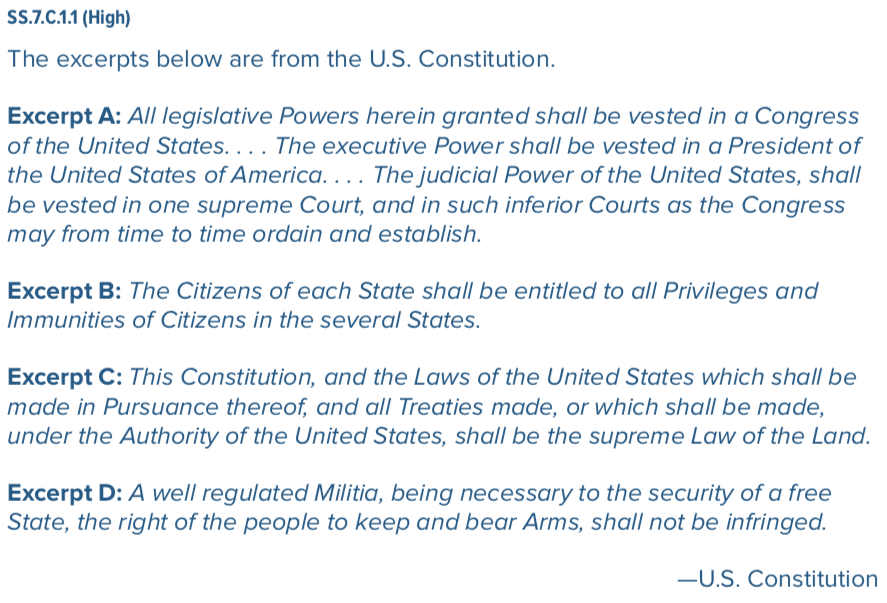
District Quarterly #3 Review
Quiz by Kirk Hansen
Feel free to use or edit a copy
includes Teacher and Student dashboards
Measure skillsfrom any curriculum
Measure skills
from any curriculum
Tag the questions with any skills you have. Your dashboard will track each student's mastery of each skill.
With a free account, teachers can
- edit the questions
- save a copy for later
- start a class game
- automatically assign follow-up activities based on students’ scores
- assign as homework
- share a link with colleagues
- print as a bubble sheet
26 questions
Show answers
- Q1Which excerpt reflects the Enlightenment ideas of separation of powers as expressed by Montesquieu?Excerpt CExcerpt BExcerpt DExcerpt A120s
- Q2Why did the British Parliament repeal the Stamp Act, which taxed many types of colonial documents?Colonists dumped British tea into Boston Harbor.Colonists threatened to declare independence from Britain.Colonists wrote to King George asking him to repeal the act.Colonists began boycotting British goods.120s
- Q3Which of the following concepts does the excerpt support?English citizens should not be prohibited from the free exercise of religion.English citizens had rights that no monarch could violate.English citizens had the right to choose their form of government.English citizens had a social contract with their monarch.120s
- Q4Which weakness in the Articles of Confederation is addressed in this part of the Constitution?There was no executive branch to enforce national laws.There was no national court system.Laws required the approval of nine states.The states had more power than the national government.120s
- Q5Which of the following complaints against the British government was included in the Declaration of Independence?executing colonists without benefit of a jury trialordering colonists to move off of lands claimed by Native Americansrequiring colonists to lodge British soldiers in their homesforcing colonists to serve in Parliament120s
- Q6Which of the following principles is being described in this passage?judicial reviewchecks and balancesjudicial nullificationpopular sovereignty120s
- Q7Based on the excerpt, what is the meaning of the phrase “form a more perfect Union”?The government would bring the states together to act as a single nation for the good of all.The government would protect citizens from conflict in the country and prevent civil war.The government would treat all people fairly and equally under the law.The government would promote liberty and freedom for all Americans.120s
- Q8Which international action was President Bush justifying with this speech?initiating a trade ban against a foreign nationcutting off diplomatic relations with a countryusing military action to halt hostile aggressionusing diplomacy to resolve a dispute120s
- Q9Which statement would correctly complete the table?Three-fourths of special state conventions vote to approve the amendment.At least two-thirds of voters approve the amendment in a national election.Three-fourths of state governors vote to approve the amendment.The Supreme Court unanimously agrees the proposed amendment is constitutional.120s
- Q10What constitutional relationship does the table illustrate?enumerated powersconcurrent powersdelegated powersreserved powers120s
- Q11How did the passage of this amendment affect the political process in the United States?It permitted people of all economic backgrounds to contribute to political campaigns.It encouraged more college-age Americans to become involved in politics.It resulted in more women being allowed to vote.It resulted in more low-income people being allowed to vote.120s
- Q12How did the Nineteenth Amendment impact the rights of Americans?It protected the right of women to vote in all national and state elections.It allowed voters to elect their senators directly.It set the minimum age for voting at 21.It eliminated the requirement of poll taxes for national elections.120s
- Q13Based on the map, how did the population changes in 2010 impact Congress?States in the West and the South lost influence and votes in Congress.States in the South and the Midwest lost seats in the House.States in the Midwest and the North gained influence and votes in Congress.States in the South and the West gained seats in the House.120s
- Q14Which of the following is a foreign policy issue?providing cost of living increases in veterans’ disability paymentsstrengthening laws that prevent companies from pollutingrequiring welfare recipients to undergo drug testingimposing an economic embargo on another nation120s
- Q15What type of law deals with the limits of the government’s power?militarycriminalcivilconstitutional120s
